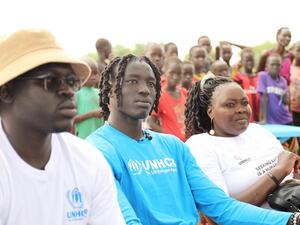Sleepless in Sittwe but dreaming of peace
Sleepless in Sittwe but dreaming of peace

Bridging the generation gap in Ma Gyi Myaing camp for internally displaced people in Sittwe, western Myanmar.
SITTWE, Myanmar, December 18 (UNHCR) - Six months ago, 55-year-old Misho was contemplating an early retirement. Today, all she wants is a roof over her head. She is one of the tens of thousands of people whose lives were uprooted when inter-communal violence broke out in western Myanmar's Rakhine state in June.
"I was cooking in the afternoon when people started shouting 'Fire! Fire!'" she recalls of that fateful day. "I ran out without slippers and cut my feet in a field that had broken glass. We spent the night in a mosque. I thought I was going to die of fright."
Overnight, the Muslim widow lost her eight-year job as a cook and cleaner with a local Rakhine family. She also lost the food stall she ran on the side, and the egg-laying chickens she raised. Her worldly possessions now consist of a blanket and sleeping mat, while home is a tent she shares with her daughter in The Chaung camp on the outskirts of the state capital, Sittwe.
"It's cold at night and I don't have an extra set of clothes," Misho says, before acknowledging, "We were lucky to come here early, because later there was no more space."
Recent arrivals include those who fled renewed unrest in October as well as displaced people who had been living with host families that could no longer sustain them. Those who don't fit into existing camps have been erecting makeshift shelters by the side of the road.
As the lead organization for protection, shelter, camp coordination and camp management under the inter-agency response to this emergency, UNHCR has been working with the government to find suitable land to set up tents for these groups.
"The first priority is to make sure there is shelter for everyone," said Maeve Murphy, who heads UNHCR's office in Sittwe. "And as camps are being set up, we work with the authorities to try and make sure they adhere to international standards, particularly from the shelter perspective."
In addition to the tented camps around Sittwe, UNHCR is also building 263 temporary shelters this year using bamboo walls and corrugated iron roofs. Each longhouse-style shelter can accommodate eight families.
Kyaw Hla, 58, is the camp administrator at Hpwe Yar Kone camp and lives in a government-built longhouse with 20 of his family members. While the shelter is adequate, other services are lacking in this location 45 minutes' drive from Sittwe. He wishes food rations could be distributed closer to the camp
and laments the fact that his family has not eaten meat or fish since June.
The women in this camp say they need proper bathing areas, hygiene materials, and cooking pots which they're using communally at the moment.
Noting that some staff working for NGOs are hesitant to work in certain locations amid continuing communal tensions, UNHCR's Murphy said, "We're continually advocating for better water sources, more sanitation facilities with individual bathing houses for women and for mobile clinics to provide health care."
In another longhouse-style camp called Ma Gyi Myaing, the basic services are in place but 61-year-old Ngine Saw Htet is still losing sleep. He mourns over his charred house, where only four pillars remain, and the loss of his battery-charging shop that drew both Muslim and indigenous Rakhine customers.
"The first 10 days I couldn't sleep," he said with furrowed brows. "Now I'm slowly recovering, but I still feel afraid when it's quiet. And I worry about the future. I have no job, no income. With no financial support, I cannot start a business. My family is fully dependent on assistance."
Over in The Chaung tented camp, Misho shares the same concerns. "I spend most of my time here praying," she says. "I pray that I can go home as soon as possible, that I can have a safe and proper house, that I can work again. I pray for peace with the Rakhine people, to live peacefully with my neighbours."
By Vivian Tan in Sittwe, Myanmar








